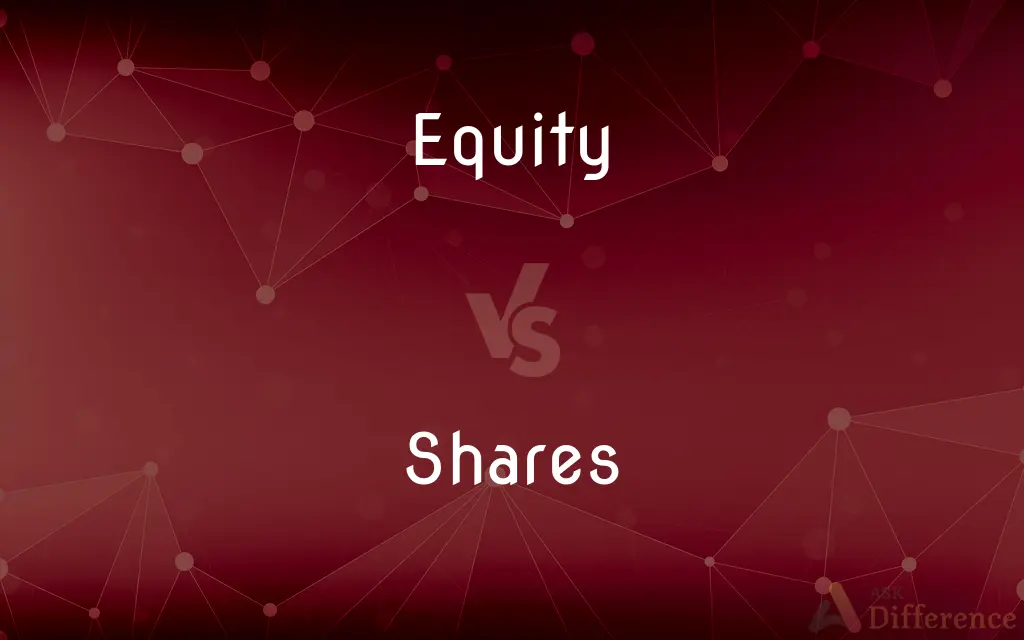Equity vs. Shares — What's the Difference?
By Tayyaba Rehman — Published on January 5, 2024
Equity vs. Shares: Equity refers to ownership interest in a company, while shares are specific units of equity representing a portion of that ownership.

Difference Between Equity and Shares
Table of Contents
ADVERTISEMENT
Key Differences
Equity in a company represents the value of ownership, which can be calculated as the difference between assets and liabilities. It reflects the owner's stake in the company. Shares, on the other hand, are specific units of that equity, each representing a fraction of the total ownership. Shares are often issued by the company and can be bought and sold on the stock market.
The term Equity encompasses all shares and other forms of ownership interest in a company. It's a broader concept that can include different types of shares (like common or preferred), as well as other ownership rights. Shares are more specific and quantifiable, representing the divisible units of equity that shareholders own.
When investors speak of owning equity in a company, they refer to their overall stake, which can be represented by the number of shares they hold. The value of their equity changes with the market value of these shares. Equity can increase through business profits or additional investments, while the number of shares typically remains constant unless more are issued.
Equity is a key indicator of a company's financial health and its value to investors, as it represents the net worth of the company. The value of shares is influenced by the performance of the company, market conditions, and investor perception, among other factors.
In accounting, equity is seen as a claim on the company's assets. It's what would be left for shareholders after all liabilities and debts are paid off. Shares are how this equity is divided among investors, with each share entitling its holder to a proportionate interest in the company’s profits, voting rights, and assets.
ADVERTISEMENT
Comparison Chart
Definition
Ownership interest in a company
Units of equity representing ownership
Representation
Overall stake in the company
Specific, quantifiable units of ownership
Scope
Broader concept including all forms of ownership
Specific shares owned by shareholders
Value Determination
Based on company's total assets minus liabilities
Market value and company performance
Financial Aspect
Net worth and claim on assets
Entitlement to profits, voting rights, assets
Compare with Definitions
Equity
Represents ownership interest in a company.
Her equity in the company increased after additional investment.
Shares
Specific units of equity in a company.
She owns 100 shares of the company, representing her equity stake.
Equity
Indicates a claim on a company’s assets.
Shareholders' equity represents their claim on the company's assets after debts.
Shares
Tradable on the stock market.
He regularly trades shares of various companies on the stock exchange.
Equity
Calculated as the value of assets minus liabilities.
The company's total equity was valued at $2 million.
Shares
Represents a fraction of ownership.
Each share gives a small portion of ownership in the company.
Equity
Reflects the net worth of a business.
The equity of the business grew as its profits increased.
Shares
Influenced by market conditions and company performance.
The company's shares increased in value after a successful product launch.
Equity
Encompasses all forms of ownership interest.
His equity stake included both common and preferred shares.
Shares
Entitles shareholders to profits and voting rights.
As a shareholder, she receives dividends and can vote at shareholder meetings.
Equity
The state or quality of being just and fair.
Shares
A part or portion belonging to, distributed to, contributed by, or owed by a person or group
The pirates argued over their shares of the treasure.
Equity
Something that is just and fair.
Shares
An equitable portion
Do one's share of the work.
Equity
Justice achieved not simply according to the strict letter of the law but in accordance with principles of substantial justice and the unique facts of the case.
Shares
One of the equal parts into which the capital stock of a company is divided
Bought 200 shares of the company's stock.
Equity
An equitable right or claim
An analysis of the equities and inequities brought about by the current trade bill.
Shares
A unit of ownership in a mutual fund or other investment vehicle
Bought two shares in a mutual fund.
Equity
Ownership interest in a corporation, property, or other holding, usually calculated as the value of the holding after subtracting any debt or liabilities.
Shares
Shares Chiefly British Stocks
European shares jumped two percent. The fund invests half the money in bonds and half in shares.
Equity
Equities Shares of common stock or preferred stock.
Shares
A plowshare.
Equity
The value of a brand's reputation.
Shares
To accord a share in (something) to another or others
Shared her chocolate bar with a friend.
Equity
Representing an ownership interest
An equity stake.
Shares
To divide and parcel out in shares; apportion
Shared the estate among his heirs.
Equity
Of or relating to stocks
An equity mutual fund.
Shares
To participate in, use, enjoy, or experience jointly or in turns
Share a responsibility.
Share a room.
Equity
Subordinated to all other claims on income, earnings, or assets
The equity tranche.
Shares
To hold or have jointly with another or others
She shares my view about the election.
Equity
Fairness, impartiality, or justice as determined in light of "natural law" or "natural right".
Shares
To relate (a secret or experience, for example) to another or others.
Equity
(legal) Various related senses originating with the Court of Chancery in late Medieval England
Shares
(Computers) To make (a digital file) accessible to other users on a network, as for copying and downloading.
Equity
(legal) The power of a court of law having extra-statutory discretion, to decide legal matters and to provide legal relief apart from, though not in violation of, the prevailing legal code; in some cases, a court "sitting in equity" may provide relief to a complainant should the code be found either inapplicable or insufficient to do so.
Shares
To have a share or part
Shared in the profits.
Equity
(legal) A right which accrues to a party in a transaction because of the nature of the transaction itself, and which is exercisable upon a change of circumstances or conditions; in other words, an equitable claim.
Shares
To allow someone to use or enjoy something that one possesses
Being in daycare taught the child to share.
Equity
The body of law which was developed in the English Court of Chancery, which Court had extra-statutory discretion, and is now administered alongside the common law of Britain.
Shares
To use or enjoy something jointly or in turns
There is only one computer, so we will have to share.
Equity
(finance) Various senses related to net value
Shares
To talk about personal experiences or feelings with others.
Equity
Value of property minus liens or other encumbrances.
Home equity
I have a lot of equity in my house.
Shares
Plural of share
Equity
(business) Ownership, especially in terms of net monetary value of some business.
Equity
(accounting) Ownership interest in a company as determined by subtracting liabilities from assets.
Equity
(poker) A player's expected share of the pot.
Equity
(nonstandard) Equality
Equity
Equality of rights; natural justice or right; the giving, or desiring to give, to each man his due, according to reason, and the law of God to man; fairness in determination of conflicting claims; impartiality.
Christianity secures both the private interests of men and the public peace, enforcing all justice and equity.
Equity
An equitable claim; an equity of redemption; as, an equity to a settlement, or wife's equity, etc.
I consider the wife's equity to be too well settled to be shaken.
Equity
A system of jurisprudence, supplemental to law, properly so called, and complemental of it.
Equity had been gradually shaping itself into a refined science which no human faculties could master without long and intense application.
Equity
The difference between the market value of a property and the claims held against it
Equity
The ownership interest of shareholders in a corporation
Equity
Conformity with rules or standards;
The judge recognized the fairness of my claim
Common Curiosities
What are shares?
Shares are units of equity that represent a portion of ownership in a company.
Can equity value fluctuate?
Yes, based on changes in assets, liabilities, and market valuation.
How is equity different from shares?
Equity is the total ownership interest, while shares are specific portions of that equity.
Can equity exist without shares?
Yes, in sole proprietorships or partnerships where ownership isn't divided into shares.
What is equity in a company?
Equity represents the owner's interest or net worth in a company.
Are shares always equal in value?
The value of shares can vary based on market conditions and company performance.
Do all shareholders have the same rights?
Rights can vary based on the type of shares owned (e.g., common vs. preferred).
How do you calculate equity in a company?
By subtracting total liabilities from total assets.
What does owning a share entitle you to?
It typically includes a claim on profits, voting rights, and a share of assets upon liquidation.
What happens to equity when a company issues more shares?
It may dilute the value of existing shares but doesn't always change total equity.
What's more important for an investor, equity or shares?
Both are important; shares determine the portion of equity an investor owns.
How do investors make money from shares?
Through dividends and by selling shares at a higher price than purchased.
Can you sell equity?
Yes, by selling shares or your portion of ownership in the business.
Are shares only issued by corporations?
Generally, yes, as they represent equity in a corporation.
How does a stock split affect shares and equity?
It increases the number of shares while keeping total equity unchanged.
Share Your Discovery

Previous Comparison
Gas Chromatography vs. Liquid Chromatography
Next Comparison
Glycolysis vs. Krebs CycleAuthor Spotlight
Written by
Tayyaba RehmanTayyaba Rehman is a distinguished writer, currently serving as a primary contributor to askdifference.com. As a researcher in semantics and etymology, Tayyaba's passion for the complexity of languages and their distinctions has found a perfect home on the platform. Tayyaba delves into the intricacies of language, distinguishing between commonly confused words and phrases, thereby providing clarity for readers worldwide.













































